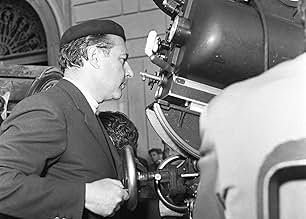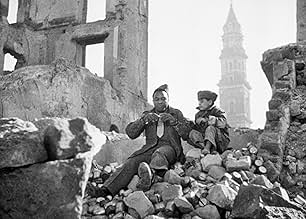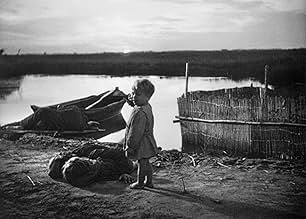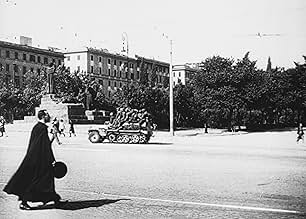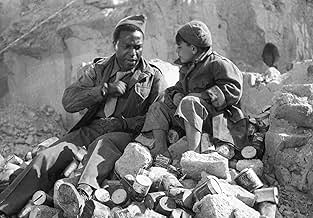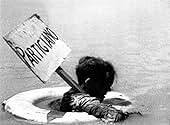Las barreras lingüísticas tienen consecuencias trágicas en una serie de historias sin relación ambientadas durante una campaña italiana en la segunda guerra mundial.Las barreras lingüísticas tienen consecuencias trágicas en una serie de historias sin relación ambientadas durante una campaña italiana en la segunda guerra mundial.Las barreras lingüísticas tienen consecuencias trágicas en una serie de historias sin relación ambientadas durante una campaña italiana en la segunda guerra mundial.
- Dirección
- Guionistas
- Elenco
- Nominado a 1 premio Óscar
- 10 premios ganados y 2 nominaciones en total
- American Soldier (episode I: Sicilia)
- (as Leonard Penish)
- Joe - American MP (episode II: Napoli)
- (as Dots. M. Johnson)
- Pasquale (episode II: Napoli)
- (as Alfonsino)
- Harriet - Nurse (episode IV: Firenze)
- (as Harriet White)
Opiniones destacadas
All six stories are my favorites, but I particularly like the monastery segment. It portrays religious prejudice by christian monks towards two priests, one jewish and another a lutheran, right in the middle of the war. To the absurdity of all, the monks come to the priests´ companion, a Christian, to make them realize "the true path". One more time, Rosselini doesn´t end the segment with lessons of moral; its ending is very ambiguous and ironic. "Paisà" is a gem; i like it better than "Roma, Città Aperta", also a masterpiece of neorealism.
The on-location shooting was a plus, too. For people who have been to Firenze, Napoli, Sicilia, Roma, or any of the locations in this film, it is a stunning sight to see places you know crawling with Nazis and Allies struggling. It endows the movie with a sense of realism that it needs badly. It needs this realism because the acting is horrendous. Of course, the unskilled acting was supposed to convey more realism, but I think it detracts in actuality.
If you are interested in history or Italy during the World War, see this film. It is a good representation of what life was like then, but beware that not everything could be represented ... so it is not all-inclusive. It is a long film, but anyone with an interest will enjoy it immensely, I think.
An American recon squad enters a Sicilian village. One of them comes from a Sicilian background. Local girl Carmela guides them past German mines taking shelter in an old ruin. Joe stays with Carmela as the rest of the squad explores and they are surprised by a small squad of Germans. Carmela Sazio is very stiff as an actress. She's an amateur and there's value in that. However her character has a lot of emoting to do and she has trouble doing it.
A group of street performing kids in Naples find drunken negro soldier Joe. Pasquale takes him around and they have an adventure. The poor kid steals from him. He turns out to be an MP and later he finds Pasquale. He is angry and drags Pasquale back home. The poverty of his home convinces Joe to leave him the boots. The kids are terrific and in this case, it's unlikely to get better actor than this amateur kid.
In a liberated Rome, American GI Fred spends the night with prostitute Francesca. He has been searching for a woman he met 6 months ago and she realizes that she's actually that woman. This is a great story but I'm not sure it's set up right. It would be great to see them 6 months earlier.
Half of Florence is liberated. All but one bridge has been blown and the partisans are struggling against the Germans. American nurse Harriet is desperate to get across to find her love. She is joined by Massimo looking for his family. The location shoot of them sneaking around an abandoned Florence is amazing.
A monastery escapes damage from the war and is visited by three American chaplains. Catholic Captain Bill Martin translates but the monks are shocked to find the other two are a Protestant and a Jew. The monks intent on converting the two disbelievers.
It's the closing stage of the war in Europe, American OSS and Italian partisans are struggling behind German lines in the Po delta. Supplies are dwindling and the fight is deadly. They rescue two downed British airmen. They are ambushed and captured. This is the most brutal of the stories and it ends the movie with its most brutal scenes.
Exploring the links between fiction and documentary, observation and education, and the individual and society, he was an important figure in the development of the cinema...
Rossellini said of the film: 'In Paisá there were two worlds which came into contact, each with a different psychology and mental structure. From this contact was born a great confusion; so much so that in the end there were neither victors nor vanquished, there remained only the everyday heroism of the man who clings to life. And who lives, despite everything, whether he is one of the victors or one of the vanquished.'
Rossellini followed 'Rome Open City' with the equally impressive Paisá, whose six, often barely dramatic stories of part-comic, part tragic encounters between Italians, Germans and liberating Americans were rooted in specific locations (the Po Valley, the Uffizi Gallery), but were universal in their portrait of an entire nation destroyed and divided by war...
Already Rossellini's taste for long, mobile takes in long shot (rather than montage and close-up) gave evidence of his desire to relate individuals to the world around them...
In using a number of non-professional cast, and combining them with his improvisatory techniques, Rossellini get an universally acclaimed human document of rare quality and compassion...
Georges Sadoul wrote that Rossellini had 'damned the horrors that war had brought to his country and his heart cry was emotionally and enthusiastically understood around the entire world.'
¿Sabías que…?
- TriviaThe monks in the fifth episode were authentic Franciscan monks from the Maiori convent, near Salerno.
- ErroresAt approximately 1:36 (2:05 version), during Episode V, as the American Army Catholic Chaplain stands in the center of the screen discussing his two associate Army Chaplains (Protestant and Jewish) with the monks, you can see two individuals standing in the doorway behind them (they appear to be the other two Army Chaplains). In less than a minute, they suddenly disappear.
- Citas
Captain Bill Martin - the catholic chaplain (episode V: Appennino Emiliano): I've never examined their consciences. I've never discussed this with them. I've never asked them anything, because I never felt I could judge them. I know them too well. They're good friends. Perhaps you, here mind this peace, this atmosphere of serene meditation, consider me guilty. I don't feel guilty. My conscience is clear.
- Versiones alternativasOriginally premiered at the Venice Film Festival on September 8, 1946 in a longer cut (running 134 minutes). Later cut to 125 minutes. The 134 min. cut has been restored from material found at the Bundesarchiv-Filmarchiv in Berlin, Germany and has premiered at the 55th Venice Film Festival in 1998.
- ConexionesEdited into Il sasso in bocca (1970)
Selecciones populares
- How long is Paisan?Con tecnología de Alexa
Detalles
- Fecha de lanzamiento
- País de origen
- Idiomas
- También se conoce como
- Paisan
- Locaciones de filmación
- Uffizi Gallery, Florencia, Toscana, Italia(episode IV: Firenze)
- Productoras
- Ver más créditos de la compañía en IMDbPro
Taquilla
- Total a nivel mundial
- USD 967
- Tiempo de ejecución2 horas 6 minutos
- Color
- Mezcla de sonido
- Relación de aspecto
- 1.37 : 1
Contribuir a esta página


